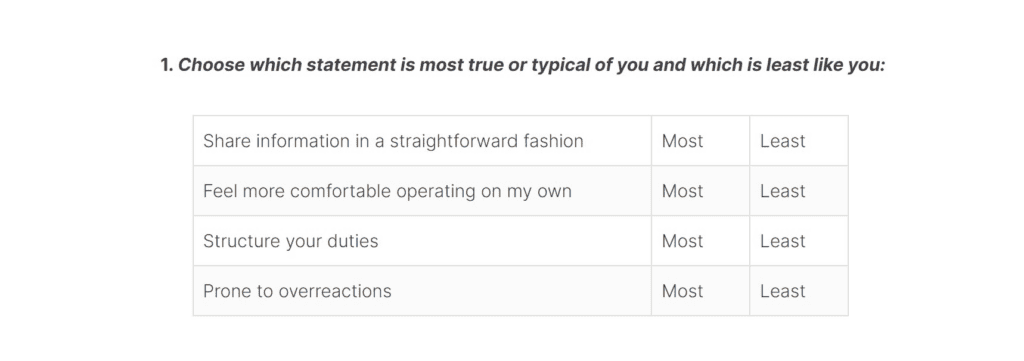
Employers are always looking for ways to streamline and simplify their candidate filtering process to select the best person for the job. This has largely been one of the driving factors behind the demand and development around personality and aptitude tests. In this post, we’ll discuss one of the oldest personality and cognitive ability tests employers use, explaining what makes it different from the others, and going over ways that you can improve your scoring potential.
What is the Caliper Assessment Test?
Pre-employment testing has been around for decades, but the Caliper Profile test is one of the oldest personality tests available. The Caliper Profile provides employers with a clear picture of both your personality traits and competencies.
A Caliper assessment measures professionally relevant core skills categories (such as attention to detail, assertiveness, and risk-taking) regarding personality traits like thoroughness, confidence, honesty, and responsibility. Caliper assessment data is primarily collected for candidates aiming for executive-level positions rather than entry-level positions, so even social phobias like anthropophobia are unlikely to affect candidate performance negatively.
Caliper Test Format Sections
The Caliper test has two sections: a personality and cognitive section. Below, we’ll briefly discuss the principal contents of each. The personality test section includes behavior-related questions that assess over 20 different personality traits across four main categories:
- Leadership is assessed by gauging traits such as ego, assertiveness, empathy, resilience, cautiousness, and ambition.
- Interpersonal Communication is gauged by assessing flexibility in decision making, openness to others and their ideas versus skepticism, as well as willingness to work in a team.
- Decision Making & Problem-Solving takes into consideration creativity, thoroughness and forethought, the ability to “think outside the box” or apply abstract reasoning, one’s willingness to take risks, and confidence.
- Time Management & Personal Organization qualities are measured by gauging risk-taking tendencies, thoroughness, and self-motivation.
The cognitive ability section measures the subject’s ability to draw general rules for particular cases. It essentially assesses how effectively and efficiently the subject can look at different types of problems and find the correct solution using numbers and figures.
Caliper test results are graded by professionals with specialized training for Caliper personality assessment and cognitive ability tests, which is why employers are confident in their profiles.
What Is a Good Caliper Profile Score?
Caliper profiles are used to gauge a candidate’s likelihood to succeed in a role. Scores range from 1-99 and indicate your levels compared to Caliper job models. Job models are made up of 5-9 key competencies required for a high success rate in a role; these are formed from an average of “ideal” profiles of high-performing employees in the same job. The higher the score, the better suited you are for a position.
| Score Range | Interpretation |
|---|---|
| 80-99 | Indicates that the candidate is a strong match for the role |
| 60-79 | Means that success in the position is highly likely but the candidate might need support with key aspects |
| 40-59 | Shows employers that the candidate will have difficulty carrying out the tasks required for the job |
| 1-39 | Signals to potential employers that the candidate is unlikely to succeed in the role |
It’s worth noting that trait and ability prioritization varies by job role, so knowing which to focus on is a major factor in terms of maximizing scoring potential. This is another way that test prep services can help you navigate the Caliper assessment.
How Do Employers Use the Results of the Caliper Assessment (Caliper Profile)?
Employers often incorporate the Caliper Assessment into their hiring process when they are seeking candidates for managerial or other high-ranking roles. The test may also be employed in situations that involve high stakes, such as when the position in question has a broad scope of responsibilities or when a poor hiring decision could lead to significant negative impacts on the organization.
Objective Decision Making
The Caliper test aims to remove subjectivity from the hiring process by providing quantitative metrics that can assess a candidate’s suitability for a role. The numerical scores help employers weigh applicants against each other in a more standardized way, reducing the influence of unconscious bias or personal preferences that might otherwise affect the hiring decision.
Specific Skill and Trait Identification
The Caliper Assessment is designed to evaluate multiple dimensions of a person’s abilities, such as their problem-solving skills, leadership potential, emotional intelligence, and more. Employers use this comprehensive data to gain a more holistic view of each candidate, enabling them to select someone who not only has the technical skills necessary for the role but also the soft skills that are often crucial for success in managerial positions.
Risk Mitigation
By offering insights into how well a candidate is likely to perform in various aspects of the role, the test also serves as a risk mitigation tool. For example, a low score in leadership abilities might suggest that a candidate is better suited for a non-managerial role. Conversely, high scores in problem-solving and emotional intelligence could indicate a strong managerial candidate.
Alignment with Company Culture and Goals
The Caliper Assessment can also help employers understand how a candidate’s behavioral tendencies and motivations align with the company’s culture and long-term objectives. This is critical for ensuring not just immediate role fulfillment but also long-term retention and growth within the company.
Post-Hiring Development
Sometimes, the assessment results are used beyond the hiring phase, serving as a developmental tool for new hires. The results can help managers identify areas where the employee might need further training or mentorship, ensuring a smoother transition into the role and potentially higher rates of long-term success.
How Do I Study for a Caliper Assessment?
Since Caliper tests have both personality and cognitive sections, studying for it can be a bit tricky. For the personality sections, you’ll first need to figure out which traits are prioritized for your role, then practice how to answer the questions to signal your strength in those areas. For the cognitive ability assessment, you’ll need to practice quickly identifying patterns and numerical reasoning.
The Caliper exam has no time limit, but most candidates take about an hour to complete all of the Caliper assessment questions. Since speed doesn’t factor into the Caliper assessment results, it’s advisable that you take your time to get the best possible Caliper profile for your job.
Navigating all of this on your own can be stressful and even trigger panic attacks for those who suffer from anxiety disorders – this is why many turn to Caliper study aids and prep packs. The JobsTestPrep Caliper Assessment Prep Packs are designed to help familiarize you with the exam, learn how to answer questions to amplify the characteristics your desired role requires, as well as sharpen your cognitive ability question response skills.
What Is Included in The Caliper Assessment Test Practice Guide?
JobTestPrep has been providing exam preparation materials for over 29 years with an 83% success rate in screening tests. This is why they’re trusted by elite universities such as Oxford and Cambridge. These prep packages are comprehensive and can be accessed directly from your computer anytime throughout the day, so even those with conditions like ADHD can comfortably study at their own pace in a comfortable environment.
All package options include a full personality test with job-specific feedback and guidance, as well as cognitive test practice complete with two visual series tests, two analogies tests, three number series tests, and two visual matrices tests. It also comes with tips and strategies compiled by psychometric experts. The only difference in the packages is how long you have access to these materials.
Caliper Assessment Test Questions: What to Expect
Caliper practice tests are broken up into different sections. Below we’ll briefly go over the types of questions you can expect to find in the actual exam and in the prep packs.
Caliper Personality Test Questions
The Caliper personality test uses 2 formats for their questions. Some questions will provide you with 4 statements which you’re asked to rate as “most” or “least” accurately describing your beliefs. Others will provide you with a 7-point Likert scale that reflects degrees of agreement.
Many of these questions come in the form of statements rather than questions, so it’s important to understand which answers are linked with which characteristics. The combination of your answers determines your score in the personality section of your Caliper profile.

Cognitive Ability Test Questions
The Caliper cognitive test also uses two types of questions. The first type is figural reasoning questions, which are questions that deal with shapes and pattern recognition. For this, you’ll be asked to correctly choose the missing or next image to complete a pattern. Other figural reasoning questions involve figural analogies. These questions require you to find the relationship between different shapes and within matrices, then correctly select an image to complete the visual analogy or missing shape to complete the matrix.
The second type of question involves number series questions. This portion of the cognitive section can be especially difficult for those suffering from dyscalculia and similar conditions. Generally speaking, these are often regarded as some of the most daunting psychometric test questions; even if you’re strong at math, these can still require a lot of practice to do well on.
Frequently Asked Questions
Is the Caliper assessment hard?
In the traditional sense, no, because there are no “wrong” or “correct” answers to the questions. However, in terms of getting results that best signal your compatibility for a specific position, it will take some practice approaching questions correctly since the implications aren’t always easy to read.
What is the best way to answer a Caliper assessment?
The less active thought you put into the answers and the less time you spend on each question, the more accurate the results. However, these results might not line up with your target job prospect since they don’t take into consideration one’s willingness and ability to adapt to perform well in their role – this is where test prep programs can help.
What’s the difference between the Caliper assessment and Myers-Briggs test?
The Meyers-Briggs test is heavily focused on one’s psychology, how a person’s mind works and how they’d react given different situations. Meanwhile, the Caliper assessment has separate sections for testing personality traits and cognitive ability, so it gauges what a person is like as well as their personal processing capabilities.
What is the best personality test?
This really depends on what you’d like to know about yourself. The differences between them doesn’t tend to be accuracy per se, but rather what their results can tell you. Many employers prefer the Caliper assessment because of how thorough and in-depth Caliper profiles are.
Can you fail the Caliper assessment?
Luckily, the Caliper assessment isn’t like a drug test where the results are black and white. Since there is no “wrong” answer, there’s technically no way to fail the test. However, the answers given indirectly signal you as either a good or poor fit for a position, based on an ideal candidate profile, since the scores indicate a person’s aptitude for specific roles/positions in a company.
- Escalaphobia: Conquering Moving Mountains, One Step at a Time - December 19, 2024
- How Psychologists Can Empower Communities - March 25, 2024
- The Potential of Medical Cannabis for Neurological Conditions - February 26, 2024
